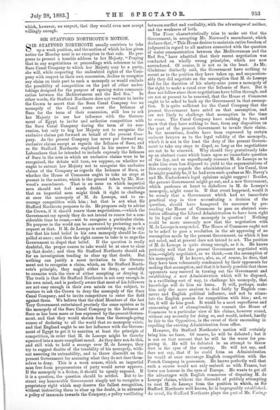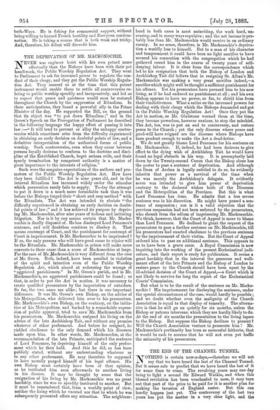SIR STAFFORD NORTHCOTE'S MOTION.
SIR STAFFORD NORTHCOTE usually contrives to take up a weak position, and the motion of which he has given notice for Monday next is no exception to that rule. He pro- poses to present a humble address to her Majesty, "Praying that in any negotiations or proceedings with reference to the Suez Canal Company to which her Majesty may be a party, she will, while respecting the undoubted rights of the Com- pany with respect to their own concession, decline to recognise any claim on their part to such a monopoly as would exclude the possibility of competition on the part of other under- takings designed for the purpose of opening water communi- cation between the Mediterranean and the Red Sea." In other words, Sir Stafford Northcote does not venture to invite the Crown to assert that the Suez Canal Company has no monopoly of the Canal route over the Isthmus of Suez for the term of their concession, still less to ask her Majesty to use her influence with the Govern- ment of Egypt to invite and authorise competition with the Suez Canal Company during the term of its con- cession, but only to beg her Majesty not to recognise the exclusive claims put forward on behalf of the present Com- pany. As the present Company has never put forward any exclusive claims except as regards the Isthmus of Suez, and as Sir Stafford Northcote explained in his answer to Mr. Labouchere that he intended to include expressly the Isthmus of Suez in the area in which no exclusive claims were to be recognised, the debate will turn, we suppose, on whether we ought to entreat her Majesty not to recognise the exclusive claims of the Company as regards the Isthmus of Suez, or whether the House of Commons ought to take no steps at present in the matter, which is the ground taken by Mr. Nor- wood's amendment. That is an issue on which impartial men should not feel much doubt. It is conceivable that an impartial man might think it right to challenge at once the monopoly of M. de Lesseps, and to en- courage competition with him ; but that is not what Sir Stafford Northcote proposes to do. He proposes only to advise the Crown, if it. should renew those negotiations,—which the Government say openly they do not intend to renew for a con- siderable time to come,—not to recognise a particular claim. No purpose in the world can be answered by preferring such a request as that. If M. de Lesseps is certainly wrong, it is only fair that his fond belief in his own monopoly should be dis- pelled at once ; and then the right course to take is to urge the Government to dispel that belief. If the question is really doubtful, the proper course to take would be at once to clear up that doubt ; and then Sir Stafford Northcote should ask for an investigation tending to clear up that doubt. But nothing can justify a mere invitation to the Govern- ment not to recognise a claim, which, on Sir Stafford North- cote's principle, they ought either to deny, or carefully to examine with the view of either accepting or denying it. The truth is that Sir Stafford Northcote is not easy enough in his own mind, and is perfectly aware that most of his followers are not easy enough in their own minds on the subject, to venture to ask the Crown to deny the monopoly of the Suez Canal Company, and to invite competitors to enter the field against them. We believe that the chief Members of the last Tory Government entertained precisely the same opinion as to the monopoly of the Suez Canal Company in the Isthmus of Suez as has been more or less expressed by the present Govern- ment, and that they would shrink from the thorough-going course of declaring to all the world that no monopoly exists, and that England ought to use her influence with the Govern- ment of Egypt to get it to sanction at least the principle of competition, in order that M. de Lesseps might be thereby squeezed into a more compliant mood. As they dare not do this, and still wish to hold a scourge over M. de Lesseps, they try to suggest doubts of the tenability of his monopoly, with- out asserting its untenability, and to throw discredit on the present Government for assuming what they do not dare them- selves to deny. This is a weak course, which an impartial man free from prepossessions of party would never approve. If the monopoly is a fiction, it should be openly exposed. If it is a question, the question should be settled. But to in- struct any honourable Government simply not to recognise a proprietary right which may deserve the fullest recognition, without instructing them to clear up the doubt, is to advocate a policy of innuendo towards the Company, a policy vacillating
between conflict and cordiality, with the advantages of neither, and the weakness of both.
The Times characteristically tries to make out that the Government, in accepting Mr. Norwood's amendment, which declares that, " This House desires to maintain entire freedom of judgment in regard to all matters connected with the question of water communication between the Mediterranean and the Red Sea," have admitted that their recent negotiation was conducted on wholly wrong principles, which are now surrendered. Of course, it is not so in the least. As Mr. Gladstone distinctly said, the Government have nothing to recant as to the position they have taken up, and unquestion- ably they did negotiate on the assumption that M. de Lesseps had for the duration of his ninety-nine years a monopoly of the right to make a canal over the Isthmus of Suez. But it does not follow since these negotiations have fallen through, and are not at present to be renewed, that the House of Commons ought to be asked to back up the Government in that assump- tion. It is quite sufficient for the Canal Company that the present Government have acted on that assumption, and are not likely to challenge that assumption in the time to come. The Canal Company have nothing to fear, and know that they have nothing to fear, from any disposition on the part of the present Government to invade their claim. In the meantime, doubts have been expressed by certain eminent lawyers as to the legal validity of the monopoly, which it is not in the least the duty of the present Govern- ment to take any steps to dispel, so long as the negotiations are not to be renewed. Why should they gratuitously take up an abstract cause which bears upon no immediate question of the day, and so superfluously reassure M. de Lesseps as to make him even less disposed to yield to the representations of this country as regards the administration of his Canal, than he might possibly be, if he had even such qualms as Mr. Davey's and Mr. Underdown's legal opinions might suggest? Besides, the present Government might go out, and a new Government, which professes at heart to disbelieve in M. de Lesseps's monopoly, might come in. If that event happened, would it be seemly that a Government which had no immediate practical step in view necessitating a decision of the question, should have hampered its successor by per- suading the House of Commons to pass an abstract reso- lution affirming the Liberal Administration to have been right in its legal view of the monopoly in question? Nothing could be more unseemly now that the negotiation with M. de Lesseps is suspended. The House of Commons ought not to be asked to pass a resolution in the air approving of an assumption made by the present Government, on which it has not acted, and at present does not intend to act. The position of M. de Lesseps is quite strong enough, as it is. He knows perfectly well that the present Government negotiated with him,—rightly negotiated, as we think,—on the assumption of his monopoly. If be knows, also, as of course, he does, that they have been vehemently condemned by their opponents for making that assumption, and that it is barely possible that those opponents may succeed in turning out the Government and establishing a new Administration which will be disposed,
in a vacillating sort of way, to challenge his monopoly, that knowledge will do him no harm. It will, perhaps, make him only the more anxious to deal fairly by English com- merce and English political influence, and not to stimu- late the English passion for competition with him ; and, so far, it will do him good. It would be a most superfluous and unmeaning act of championship to commit the House of Commons to a particular view of his claims, however sound,
without any necessity for doing so, and would, indeed, hardly be fair to the Opposition, in the event of their succeeding in expelling the existing Administration from office.
However, Sir Stafford Northcote's motion will certainly bring him no fame. Of course, he will be defeated ; but it is not on that account that he will be the worse for pro- posing it. He will be defeated in an attempt to throw dust in the eyes of the country. He will not say, and dare not say, that if he could form an Administration he would at once encourage English competition with the French Company in possession. He knows perfectly well that such a course would not only embroil us with France, but lower our honour in the eyes of Europe. He wants to get all the advantages with English commerce of disputing M. de
Lesseps' claims, without the discredit of publicly attempting to oust M. de Lesseps from the position in which, as Sir Stafford Northcote well knows, he is impregnably established. As usual, Sir Stafford Northcote plays the part of Mr. Facing. both-Ways. He is fishing for commercial support, without being willing to hazard French hostility and European condem- nation. He is taking a course that is both weak and tricky. And, therefore, his defeat will discredit him.



































 Previous page
Previous page